Long Term Conditions
LONG TERM CONDITION CARE
St. John’s Way Medical Centre are improving the way we work with patients with long-term conditions
What is a long term condition?
Long term conditions (LTCs) are those that impact individuals over a long period of time, such as diabetes, high blood pressure or asthma It is recommended that patients living with LTCs attend for review each year with their practice or specialist to optimise their care.
How has the LTC Annual Review process changed?
From October 2023 patients with the following LTCs will be invited for review within the month of their birth:
· Diabetes (Type 1 and Type 2)
· Cardiovascular disease (for example strokes, heart failure, ischaemic heart disease, and peripheral artery disease)
· Hypertension (High blood pressure)
· Hyperlipidaemia (High cholesterol)
· Non-alcoholic fatty liver disease
· Atrial fibrillation
· Chronic kidney disease
· Asthma
· Chronic obstructive pulmonary disease
If you have more than one of these long term conditions we will try to group these a far as possible to streamline your overall number of reviews and reduce unnecessary duplication of tests and checks.
We will aim to work with you to improve your health by considering what matters to you. We will consider your individual needs and preferences as well as best practice for your long-term condition. Our goal is that by planning together with care, patients will have the confidence to manage their health, reduce their risk of being admitted to hospital, and have a better quality of life.
What can you expect?
If you have one of the long-term conditions listed above, you will be offered at least three check-ins per year – starting in your month of birth. Each stage is described below for you:
1. Part 1 Appointment
In your Part 1, our nurses or health care assistant will carry out all the checks and tests you need to monitor and manage your long-term condition. You will receive a blood test on the day in practice (where
possible) and have other checks like a blood pressure and weight. Our nurses will also discuss a few lifestyle factors with you such as smoking and exercise.
Please note that some patients may receive a text with a questionnaire in advance of your Part 1 review so that we can collect some basic information about the control of your condition and your general health ahead of time. Responding to these messages will better inform the clinician who undertakes your review – so please try to do so where possible.
2. Receive your test results and your Care Plan
After two to four weeks, you will receive your test results (by post, text, or email, however you prefer).
We will also send a blank document called a Care Plan.
A Care Plan is an agreement between you and your healthcare professional to help you manage your health and support day to day. In your Care Plan, you can record things that are important to your health and wellbeing.
A Care Plan covers:
• What is important to you and the goals you have
• How to get the most out of your medication
• The care and support you need from others
A healthcare professional will review your results and care plan with you in your Part 2 appointment. Please start to fill in your Care Plan ahead of this appointment where possible.
3. Part 2 Appointment
You will then be invited to a Part 2 Appointment with a healthcare professional. This may be with a doctor or another member of our team such as a nurse, health care assistant or pharmacist who is well placed to support your care and can spend more time with you. This appointment will take around 30 minutes.
You can discuss your long-term conditions, test results, treatment, and anything else that is affecting your health. Together, we will aim to look at what matters most to you and agree some goals. Your Care Plan will then be updated with what has been agreed.
4. Part 3 or Follow-up Appointment
Three to six months later, you will be invited to a Follow-Up Appointment. This will last up to 15 minutes and is an opportunity to update your Care Plan with a healthcare professional, considering what is going well and where you may need more support. Some patients may require more than one follow-up appointment in a year.
How will I be contacted if this is for me?
We will contact you within your month of birth (or a little earlier) via text, phone call, or letter to organise your appointment. If you don’t hear from us in this time frame and you have one of the named conditions above please get in touch via our reception team.
This is a visual representation of the new process:

Feedback
Dear patient as part of your long term condition process, you will be asked to complete an anoymous feedback form
Thank you for agreeing to complete this questionnaire.
Service Improvement
Thank you for agreeing to complete this questionnaire about your appointment today. It will help us improve our service.